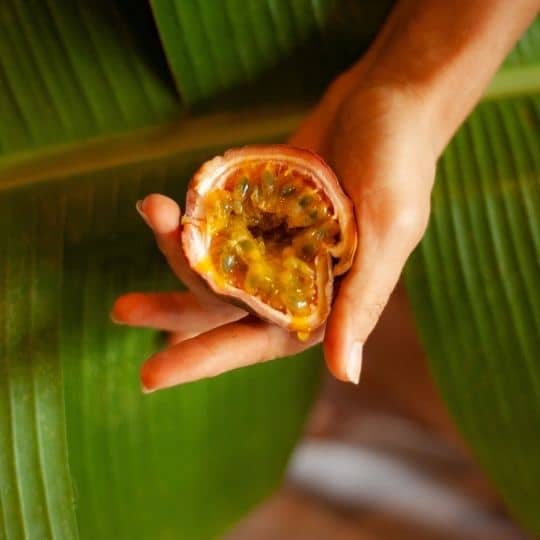Can dogs eat passion fruit with us?
Passion fruit has a nutritional value but contains ingredients in its seeds and crust that are toxic for dogs. That is why the dogs can’t eat all parts of the fruit.
It’s best to play it safe and not give your dog a passion fruit at all.
We discuss the reasons behind this toxicity in this article. So, if you’re curious to find out more, keep on reading!
Can Dogs Eat Passion Fruit At All?

Technically – yes, they can eat small amounts, but they can only eat a fleshy part of the fruit. They can’t eat the crust of the fruit or seeds.
It’s very typical of dog owners to want to share food with their dogs.
Most of the time, they are not sure what is and what is not dangerous for them. Such is the example of feeding their dogs spoiled meat.
Passion fruit looks very pretty and has a nice taste, but dogs should not eat them.
As a Veterinarian, I’m going to explain what part of the fruit dogs can eat and what part they should avoid.
Also, I’m going to explain my suggestion of why it’s best to not give your dog a passion fruit to eat at all!
What Is Passion Fruit?

Passion fruit, also known as Passiflora, is a tropical vine that has flowers.
It’s hard to pinpoint the main place of origin of this fruit, but it most likely originated in South America or Amazonian Brazil.
Today, passion fruit grows in other warm climate areas including Australia, South Africa, New Zealand, Hawaii, Israel, India, and others.
It reached high commercial success because of its unique looks and taste.
Passion fruit has a strong, woody vine that can climb up to 10-15 feet! Its leaves are 3-lobed, evergreen, with a deep green, glossy look.
The flowers of this perennial plant come in various sizes and shapes, as Passiflora counts over 400 species. Moreover, all of these flowers have a recognizable, tropical look with vivid colors.
FUN FACT: The flowers of the passion fruit have a fragrance just like the fruit itself! This way they attract pollinators, but can attract your dog as successfully as lawn mushrooms or truffles do.
The fruit of the Passiflora plant is arguably what made it most popular and widely known. It’s medium-sized and goes from yellow to dark purple color as the plant matures.
The passion fruit has hard skin on the outside and a soft yellowish pulp on the inside with black seeds. It has a sweet but slightly tart flavor.
For people, both pulp and black seeds are edible. In fact, passion fruit is often used in cooking! [1]
Passion fruit has many health benefits too, as its nutritional value is very high. They make a great source of Vitamin A & C, magnesium, potassium, iron, and minerals important for nerve and organ functions.
They lower blood pressure, reduce cancer risk, promote skin repair, and also support healthy weight loss as they are high in fiber. [2]
Why You Should Not Give Passion Fruit to Your Dog

If there are so many benefits to this fruit, why can’t I just give it to my dog?
Dogs can eat the pulp or fleshy part of the passion fruit, but they should avoid the seeds and skin of this fruit.
This is because both skin and seeds of passion fruits contain cyanogenic glycosides – in other words – poisonous cyanide. In fact, the more unripe or immature the plant is – the more toxic it is as it contains more cyanide.
Unripe passion fruit is therefore more toxic to dogs, but can be toxic to humans as well! [3]
Some of the most common effects of cyanide toxicity in dogs include diarrhea, vomiting, and other health issues which can be fatal.
To Sum Up: The pulp of the passion fruit is safe for your dog to eat, but the many little seeds it contains are not! It’s almost impossible to split the seeds from the pulp, so it’s impossible to feed it to your dog safely!
Because the risks are higher than the benefits – you should avoid giving your dog passion fruit altogether.
What If My Dog Loves Eating Passion Fruit?
Can dogs eat passion fruit in small amounts?
The rule is simple. Just because you love eating takis or passion fruit, doesn’t mean your dog has to eat it.
The easiest way for your dog to get to the passion fruit is to eat the ones fallen on the ground. In that case, simply hoping that your pet won’t eat one too many passion fruits is too risky.
If this plant is nearby, you should keep a close eye on your pet and never let it eat this fruit!
But, when it comes to store-bought passion fruit, this is the situation in which owners have more control.
It’s possible to feed your dog passion fruit if you find that your dog likes it. However, always make sure to do so in small amounts and by separating seeds and skin from the fleshy part!
After doing so, be sure to throw away the fruit’s skin and seeds at the place where your dog can’t reach them.
If you are unsure if the fruit is ripe yet, then it’s best to avoid feeding it to your dog.
The chances your dog will eat the poisonous seeds and skin are higher the more often you feed it passion fruit. This is why you can feed your dog passion fruit in small amounts and never too often.
Passion fruit is simply not suitable as dog food or a frequent dog treat, which is why I recommend other dog foods.
Health Risks for Dogs Eating Passion Fruit

Can dogs eat passion fruit without health risks?
As mentioned previously, by separating the seeds and fruit’s skin from the pulp, you ensure your dog eats passion fruit safely. Dogs usually get fed once per day, but you shouldn’t feed them passion fruit as snacks either.
You should keep in mind that the risks are rarely zero. It’s also sometimes hard to spot symptoms of poisoning in some dogs before it’s too late. [4]
The more often your dog eats passion fruit and the bigger the amounts, the risk of cyanide poisoning is higher.
Some of the most common cyanide poisoning symptoms in dogs include:
- Difficulty breathing
- Diarrhea
- Hyperventilation
- Tremors
- Nausea
- Vomiting
- Convulsions
- Skin irritations
- Tachycardia
- Increased or irregular heart rate
- Coma
Other severe side effects might happen, so make sure to keep your dog safe and healthy. Don’t give it passion fruit at all and don’t take the risk of disrupting your dog’s health.
If your dog is allergic to passion fruit, the risks are often higher.
Allergies that passion fruit can cause are often associated with latex, pollen, or other fruit allergies. [5]
If your dog never ate passion fruit but has other known allergies, it’s best to avoid feeding it passion fruit completely.
My Dog Ate Passion Fruit – What Should I Do?
What should I do if my dog accidentally ate passion fruit?
Maybe you taught your dog not to eat passion fruit, but your stubborn dog still ate it.
It’s best not to assume the best and ignore the symptoms we just discussed. If you notice any symptoms of cyanide poisoning in your dog, we recommend you consult your vet immediately!
Don’t postpone it as you may not know if your dog is allergic, or if the consequences turn out to be fatal. The seeds and crust of passion fruit are toxic and your dog likely ate it by finding it.
Because this fruit smells and tastes delicious, your dog most likely ate a lot of it. In that case, take it to the vet immediately.
The only exception is if your dog ate a small amount of passion fruit and is not showing any symptoms of toxicity.
In that case, keep a close eye on your pet for the next 24-48 hours. If any symptoms show up, take it to the vet.
If you’re still confused about what you can feed your dog, check out our articles on feeding your dog with mackerel fish or even edamame.
The Bottom Line
Dog owners often ask veterinarians if they can share food with their dogs. The question they sometimes get is – Can dogs eat passion fruit, like us?
Unfortunately, dogs can’t eat everything like us. Our digestive tract is similar but not the same.
Dogs are exclusive carnivores, so vegetables and fruits do not have to be in their meal. Passion fruit is one of the things that your dog does not need.
It’s very challenging to separate the crust and seeds from passion fruit, so it’s not recommended that you give passion fruit to your dog at all. You can always feed your dogs other treats that are safe for their health.
